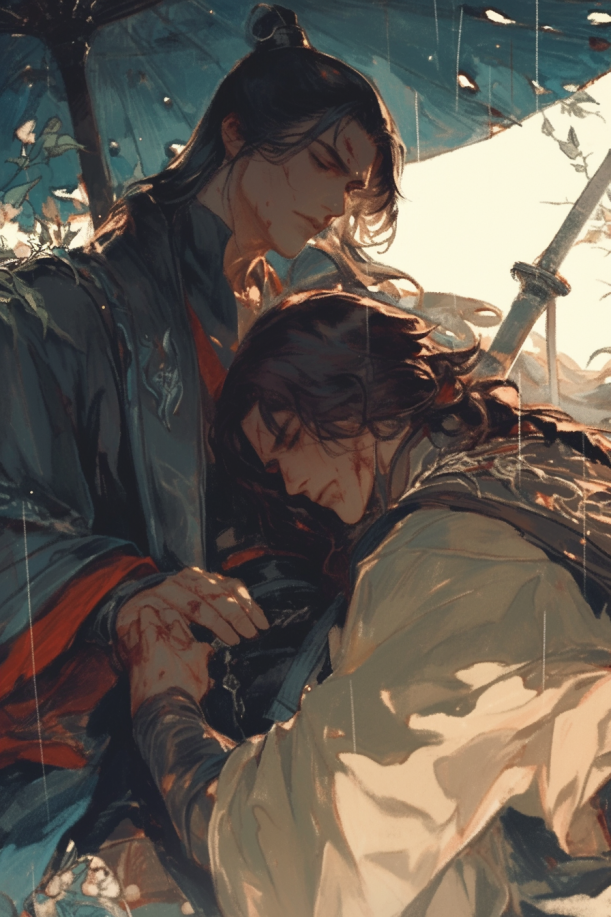Chapter 3
The so-called “celestial artifacts” are objects inscribed with talismans by “immortals,” things that ordinary people simply cannot imitate—there are countless types of celestial artifacts, with uses as varied as can be imagined: lamps that never need oil, paper that cannot be burned by fire, beds that stay warm in winter and cool in summer, and so on.
In the past, a traveling storyteller once came to the village entrance and spoke of grand cities where houses were built with “immortal bricks,” their roofs shining like glazed tiles under the sun, resplendent as palaces. The rice bowls used by wealthy families were coated with talismans written by high-level immortals, able to ward off all poisons and diseases. Even a single shard from a broken bowl could fetch four taels of gold, yet people still clamored for them.
“Immortals,” also known as “cultivators,” or sometimes “daoists” or “true men”—the latter two are usually self-proclaimed, sounding a bit more modest.
It is said that they begin by drawing in spiritual energy and communing with heaven and earth. With deeper cultivation, they can live without food, travel the skies and the earth, even achieve immortality and ascend after overcoming tribulations... Such legends are widespread, but as for what a real immortal looks like, no one has ever seen—only heard tales that sound miraculous.
Immortals are elusive, and good celestial artifacts are even harder to come by, making nobles and officials chase after them with fervor.
Mrs. Carter bent down, gazing earnestly at Henry Carter, and asked in a gentle, almost pleading voice, “When Erlang returns after mastering his studies, will you make a perpetual lamp for your mother too?”
Henry Carter did not answer. He merely lifted his eyelids to glance at her, thinking coldly to himself, “Wishful thinking. Today you send me away, and whether I succeed or fail, live or die, become a pig or a dog, I will never come back to see you again.”
Mrs. Carter suddenly froze. She realized that this child was unlike his parents, but rather bore a trace of her own elder brother.
Her elder brother was like that wisp of green smoke rising from the family’s ancestral grave. From a young age, he was unlike a farmer’s child, with features as delicate as a painting. Their parents spent everything to send him to school, and he lived up to their hopes, passing the county exam at just eleven. People said their family had been blessed by the star of literature.
But perhaps the star of literature was not meant to linger in the mortal world. Before he could pass the next exam, he fell ill and died.
When her brother died, Mrs. Carter was still young, and her memories had grown hazy. Now, recalling him suddenly, she realized that when he was alive, no matter if he was overjoyed or furious, he always gave such a light, indifferent glance—reserved and unreadable, making others feel uneasy and unable to get close.
Unconsciously, Mrs. Carter let go of Henry Carter’s hand. At the same time, Henry Carter also quietly took half a step back.
And so, in this gentle and wordless way, he brought the parting of mother and son to an abrupt end.
Henry Carter believed that his actions were not out of resentment. Resentment made no sense—his parents had given him life and raised him. Even if their kindness ended halfway and they abandoned him, at most, their merits and faults canceled each other out.
He lowered his head to look at his toes, telling himself, “It doesn’t matter that my parents don’t care about me. It doesn’t matter that they sold me to a squinty-eyed daoist.”
☆ Chapter 2
Henry Carter left with Mr. Ethan Clark.
Mr. Ethan Clark was as withered as a stick, so thin that three veins seemed to hold up his head, which was topped with a wobbly hat. He led Henry Carter by the hand, looking like a traveling troupe leader with his newly abducted little sidekick.
Henry Carter still looked like a child, but inside, he already had the heart of a youth.
He walked in silence, but in the end, couldn’t help glancing back.
He saw his mother with a broken basket on her back, his little brother sleeping inside it, her own face blurred with tears outside the basket, while his father stood silently to the side, head bowed, whether sighing or ashamed, refusing to look up at him, standing there like a dull, gray shadow.
Henry Carter withdrew his gaze without much reluctance. The uncertain road ahead seemed like endless night, and holding his master’s withered hand felt like holding the family’s heirloom lamp—though it boasted the “immortal” prefix, it could only light up a few inches ahead, pretty but useless.
There are generally two ways to travel: one is called “wandering,” the other “fleeing.”
Following his master, Henry Carter not only had to endure meals in the wind and sleep in the dew, but also had to listen to the old man’s endless nonsense and twisted logic. It was hardly worthy even of being called “fleeing.”
As for seeking immortality, Henry Carter had heard a thing or two.
In this world, those with wild dreams of knocking on the gates of immortality were once as numerous as fish in the river.
During the late emperor’s reign, sects and schools sprang up everywhere like frogs after the rain. Anyone with a surplus of children would pull strings to send one off to some sect to seek the Dao, learning tricks like “breaking stones on the chest.” But aside from that, no one ever seemed to achieve anything real.
At that time, there were more people making elixirs than cooking meals, more chanting scriptures than farming fields. For years, hardly anyone studied or practiced martial arts properly, letting idle charlatans run wild everywhere.
